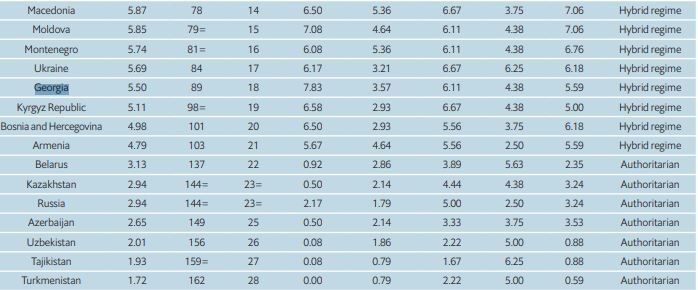Georgia ranks 89th in Democracy Index 2019, in a global year of ‘democratic setbacks’

Caption: Georgia also ranked 89th in the 2018 survey with the score of 5.50 which was decreased to 5.42 in 2019. Photo: Nino Alavidze/Agenda.ge.
The twelfth edition of the Democracy Index has ranked Georgia 89th among 167 independent states and two territories, with the score of 5.42 of total 10.
With the score, which was 5.50 in 2018 ranking, Georgia remains in the category of ‘hybrid regimes.’

- Hybrid regimes: scores greater than 4, and less than or equal to 6.
- Hybrid regimes: Elections have substantial irregularities that often prevent them from being both free and fair. Government pressure on opposition parties and candidates may be common. Serious weaknesses are more prevalent than in flawed democracies—in political culture, functioning of government and political participation. Corruption tends to be widespread and the rule of law is weak. Civil society is weak. Typically, there is harassment of and pressure on journalists, and the judiciary is not independent.
Of the neighbouring countries Armenia ranked 86th, Azerbaijan – 146th, Turkey – 110th and Russia – 134th.
The ranking of 2018.

The Economic Intelligence Unit, a UK-based company providing the index, reports that the average global score has fallen from 5.48 in 2018, to 5.44.
This is the worst average global score since the Economist Intelligence Unit first produced the Democracy Index in 2006,” the survey notes..
In 2019 Eastern Europe’s average score in the Democracy Index remained unchanged at 5.42 compared with 2018.

This remains markedly below the region’s score of 5.76 in 2006, when the index was begun. Improvements in the scores for a few countries, notably Armenia and Ukraine, were offset by falling scores for others, notably Belarus and the Kyrgyz Republic. In total eight countries’ scores rose in 2019, nine fell, and 11 stagnated,” the Economic Intelligence Unit says.
They say that “no Eastern European country moved categories in 2019”, meaning that there are still no “full democracies” in Eastern Europe.

There are, however, 12 countries that are classed as ‘flawed democracies’, including all of the 11 EU member states plus Serbia; and nine that are classed as ‘hybrid regimes’ (the remaining western Balkan states plus Ukraine, Moldova, Armenia, Georgia and the Kyrgyz Republic). The rest are ‘authoritarian regimes,” the survey says.
The Economist Intelligence Unit (The EIU) is the research and analysis division of The Economist Group, a daughter company of The Economist newspaper.
 Tweet
Tweet  Share
Share